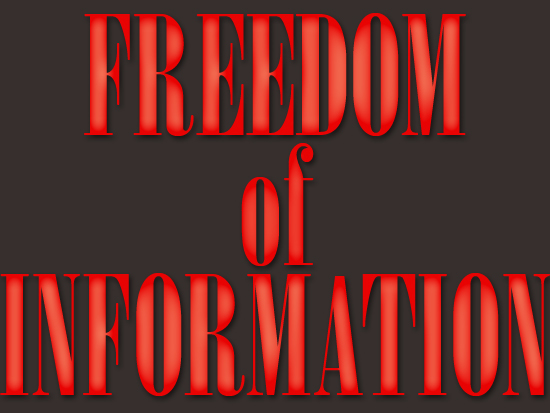
EVEN as the Selangor government is being lauded for introducing freedom of information (FOI) legislation in the state, much is lacking in the Pakatan Rakyat-led government’s enactment. Indeed, the Selangor government may be shortchanging citizens in the state with its version of FOI.
There are two reasons why access to information is a vital right in a democracy. First, a democratic government legislates and governs on the people’s behalf. It regularly puts itself to voters, who judge its performance and promises, and the performance and promises of others. Based on this judgment, voters decide whether to entrust the same people, or different people, with governing and legislating in the following term. To make this decision, people need to have information on which to base their choice. The information could be about economic performance, or public projects that improve infrastructure, or social justice or a clean environment.
The second reason is more fundamental. Information belongs to the state and to the people. It does not belong to the people in power, much the same as government treasury, buildings, resources and infrastructure do not belong to the people in power. Likewise, information is not owned by politicians to be used for their own ends, but by the state on behalf of the populace.
It’s this key idea that is missing from the Selangor FOI enactment. The Pakatan Rakyat may have done well in getting the draft legislation this far. But what’s being proposed makes little fundamental difference to business as usual because it is still premised on the idea that information belongs to the government, not to the people.
What’s missing
Civil society went through various stages of input into the draft FOI legislation. Even before Selangor announced its intentions, civil society already had a draft bill. This was put together in consultation with a wide range of people such as women’s groups, indigenous rights activists and media practitioners, and had input from international organisations that work on FOI legislation. This bill was further strengthened after Selangor announced its intentions.

There are some good points in the Selangor FOI enactment. It’s great, for example, that Selangor has included that access has to be granted to the illiterate, and in a suitable language. This is particularly important for indigenous rights activists, but is bound to benefit others as well.
Still, too much is missing from the Selangor legislation, including six key points – based on international best practices – which the Malaysian civil society draft had, as follows:
1. Maximum disclosure
This is the key idea mentioned above. Everything the state knows, the people should know, unless there’s a really good reason against it. In contrast, the current draft from the Selangor government, published online, says that information officers “may” give out information. That’s a long way from their being obligated by law to release information. There is no right to know, just the chance that a citizen might be told what she or he wants to know. This leaves the field wide open to personal interpretation and hence, abuse.
2. Narrow exemptions
This is vital to reinforce point one. There is information that the state can’t release because it would endanger lives, for example. But these areas need to be clearly and narrowly defined. Unfortunately, in the Selangor enactment, instead of a clear section on “exemptions”, the enactment defines “information” that excludes certain types of information. Worse, it leaves it open for more information to be added to this exemption list without legislative change. What this means is that anything the state wants to hide can be added into the exemptions, with little transparency.
There should also be a public interest test for these exemptions. So even if information is protected, it can be released if there is overriding public interest. This element is missing in the Selangor enactment.

3. Protect whistleblowers
It may be that this is difficult to do given the limitations of state powers, but there is no attempt in the Selangor law to provide whistleblowers with any protection.
4. Routine publication
Some information is predictable, largely boring and of interest only to those who list “trainspotting” as an occupation. It can cut down the government’s workload tremendously to publish such information online. The federal-level Statistics Department does a good job of this, as does the Department of Environment and the Communications and Multimedia Commission.
The Selangor law could have included an obligation on state departments to review its output and see what could be easily and cheaply published, for instance, online, on a routine basis. There’s no such obligation in the Selangor law.
5. Low costs, simple procedures
It says in the bill that there will be a fee. It doesn’t say how much. This is one of the easiest ways of keeping secrets from the general population: make sure they can’t afford to purchase information.
The other point is simple procedures. The main problem here is that the Selangor government wants people to give a reason for accessing information and threatens to fine them up to RM50,000 if they use it for anything else. Now, let’s say I want information on water contracts to help me sleep at night. And while reading them, I find something which indicates that there was a huge pay-off to a government officer by one of the contractors. Under the current enactment (with no protection for whistleblowers), I would be fined for revealing this information. More importantly, once again, this goes against the idea that the information belongs to the people and is held in trust by the government.
Forms to access information also need to be simple, and not require information that is irrelevant to processing information requests.
6. An independent administrative oversight body
This is the trickiest bit of all. It may be that the Board of Appeals that is set up under the enactment will be an independent body. But, the procedures for appointment are similar to Suhakam‘s. And we know how much criticism they get.

So, the body needs to be both independent and be seen to be independent, which is hard in a Malaysian context. What civil society proposed was an open appointments process based on published criteria. That way, if applicants, or the general public, were unhappy with the appointees, they would have to state why in reference to those criteria. They could make a case against the appointees based on more than hearsay or malice. And likewise, the selection board could justify their decision on more than just hearsay and goodwill. The current process falls far short of that.
The Pakatan Rakyat government in Selangor has been applauded for being the first government in Malaysia, albeit at the state level, to have introduced FOI laws. Indeed, Selangor’s initiative now puts the pressure on other states and the federal government to follow suit. However, unless Selangor demonstrates a real seriousness about having FOI laws that include best practices in FOI legislation to ensure maximum transparency and openness, Malaysians should hold back on the standing ovation. ![]()
Sonia Randhawa was the National Campaign for a Freedom of Information Act coordinator and gave input to the draft legislation for Selangor.
The Nut Graph needs your support


Sean says
Is the fee for the information or the retrieval of the information? If the former, there’s the prospect of some sort of ‘contract’ between the state and the requester over ownership of the information, isn’t there? Are requesters free to publish (adequately cited, natch) the information themselves? Your ‘reason fine’ comment makes me think not. I’d much prefer to see a charge made for the effort that goes into releasing the information into the public domain. Once a document has been formatted for public consumption and posted (mail, online or noticeboard), there doesn’t seem to be any further excuse to makan duit.
Naoko says
Usually, from what I remember in my old classes, the money is usually for the “retrieval” of information. Basically if the info is already online and if you get it from the official channels, there are no charges. But if the info is not online (or publicly available already), then you’d need to make a request and there will be a small fee to retrieve said information.
mykantree says
This fee thing seems to be open to interpretation based on this post and comments about it. It should be clearly defined; whether as a search fee or information fee. In fact the amount should also be specified and be published. Otherwise it will be as opened to abuse as with so many other services the public requires from the government.
I also agree with the writer that the other five missing “links” need to be reviewed, as it looks like the whole purpose of the FOI may be made redundant if they were not, to address the stated concerns.